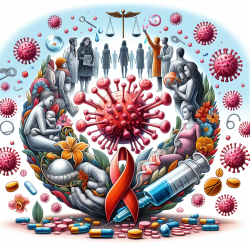Parents of children with intellectual and developmental disorders (IDD) face unique challenges that can lead to both posttraumatic stress (PTS) and posttraumatic growth (PTG). A recent study published in the European Journal of Psychotraumatology sheds light on the risk and protective factors associated with these experiences. By understanding these factors, practitioners can better support parents in navigating their emotional journeys.
The Dual Nature of Parenting Trauma
The study highlights that parenting trauma is a double-edged sword. While it contributes to increased PTS, it also plays a positive role in promoting PTG. This dual nature suggests that while traumatic experiences can be distressing, they also have the potential to lead to personal growth and resilience.
Practitioners should be aware of this duality when working with parents. Encouraging them to reflect on their experiences and identify areas of growth can help shift their perspective from one of pure adversity to one that includes positive transformation.
The Role of Social Support
Social support emerged as a crucial protective factor in the study. It was associated with lower levels of PTS and higher levels of PTG. This finding underscores the importance of fostering strong support networks for parents.
- Create Support Groups: Facilitate peer support groups where parents can share experiences and strategies.
- Encourage Community Engagement: Connect parents with local resources and community programs that offer support.
By enhancing social support, practitioners can help mitigate the negative effects of trauma and promote healing and growth.
Addressing Barriers to Mental Health Care
The study identified barriers to mental health care as a significant risk factor for increased PTS. These barriers include limited access to services, long waitlists, and stigma surrounding mental health treatment.
- Simplify Access: Work with healthcare providers to streamline access to mental health services for parents.
- Tackle Stigma: Educate parents about the importance of mental health care and normalize seeking help as a strength rather than a weakness.
Tackling these barriers is essential for ensuring that parents receive the support they need.
The Impact of Parenting Style
The study found that negative parenting practices were weakly associated with PTS but not significantly related to PTG. This suggests that while parenting style may influence stress levels, other factors play a more significant role in determining growth outcomes.
Cultivate Positive Interactions:
- Praise Positive Behaviors:
- Create Consistent Routines:
The Path Forward for Practitioners
This research provides valuable insights into how practitioners can better support parents of children with IDD. By focusing on enhancing social support, reducing barriers to care, and encouraging positive parenting practices, practitioners can help parents navigate their challenges more effectively.
If you're interested in exploring this topic further or implementing these findings into your practice, consider reviewing the original research paper for a more comprehensive understanding: Risk and protective factors for posttraumatic stress and posttraumatic growth in parents of children with intellectual and developmental disorders.










